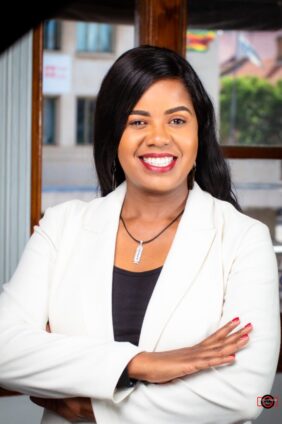Paradigm Initiative (PIN), a pan-African non-governmental organisation, has reaffirmed its dedication to monitoring and implementing the Global Digital Compact.
Global initiatives aimed at creating an improved digital future for everyone have gained traction with the approval of the Pact of the Future at the current UN Summit for the Future.
By supporting the adoption of the Pact of the Future alongside the Global Digital Compact (GDC), PIN highlights the necessity of developing and using technology in ways that respect human rights while leveraging its benefits to close digital divides.
The organization’s Senior Manager for Partnerships and Engagements, Thobekile Matimbe, recognizes the intricate negotiations that preserved significant provisions in the text and appreciates the GDC as a framework promoting digital rights and bridging the digital divide.
He notes that the adoption is significant for the organization as it aligns with their vision outlined in the 2024-2028 Strategic Management Plan to promote a digitally inclusive and rights-respecting world.
“It goes on to affirm its position to monitor the GDC implementation and to ensure it unpacks its text to communities within the Global South in collaboration with government actors and international agencies that are willing to collaborate,” he said.
In response to the Interactive Dialogue on Enhancing Multilateralism for International Peace and Security at the UN Summit of the Future, PIN emphasizes the need for a multistakeholder approach to ensure that technology development respects human rights and promotes peace and security.
“We recommend the ongoing cyber treaty-making process to consider this. In addition, establishing accountability mechanisms within the United Nations to hold both States and Technology Companies accountable in line with international human rights law obligations for States and business and human rights responsibilities for the private sector is pertinent,” Thobekile said.
PIN advocates for the creation of clear guidelines on using technology as an early warning tool to prevent conflict and evaluate the human rights implications of its deployment.
Regarding content moderation, PIN emphasizes the need for policies, laws, and community standards that carefully balance protecting freedom of expression while promoting peace and security, along with clear guidelines to foster international cooperation for a new peace agenda.
“To this end, we recommend the UN prioritizing processes that ensure the voices of those in the Global South are heard and included in approaches to strengthening the "do no harm principle through UN platforms in the form of dialogues addressing peace through the use of technology."
In this course, it is important to ensure that those in the Global South have adequate resources to participate in these processes.
In addressing Interactive Dialogue 3, PIN emphasizes that in alignment with the principles of inclusion, gender equality, and safe, trustworthy emerging technologies outlined in the GDC, it is crucial to urgently tackle the digital divide in the Global South.
“Our Londa 2023 report on digital rights presents that only 10 out of 26 African countries reported are transparent about the utilisation of Universal Service Funds (USF) to bridge the digital divide with the potential to promote digital inclusion of under-served communities. We recommend cooperation that bridges the digital divide through deliberate utilisation of the USF and prioritisation within national budgets towards improving digital public infrastructure.”
Fewer than 10 African countries have national AI strategies, and PIN stresses the need for these strategies to reflect state commitments to human rights and engage civil society organizations for a rights-respecting, inclusive digital future. They recommend expanding dialogues on AI and emerging technologies within the Internet Governance Forum and other UN platforms to consistently gather input from diverse stakeholders and build consensus.
“We call for Member States engagement with organisations like ourselves involved in digital literacy programmes across Africa through initiatives such as the LIFE Legacy Programme which we are implementing across Africa and has improved digital literacy for over 150,000 beneficiaries.”
Latest Stories
-
Dismiss Basintale, Hannah Bissiw over Ablekuma North re-run violence – Minority to gov’t
6 minutes -
Deloitte ranked number 1 consulting service provider for 8th consecutive year
7 minutes -
UDS step up preparations for World University Games in September
9 minutes -
GRNMA halts planned strike after productive talks with gov’t
11 minutes -
Only 22% of households in Ghana used clean fuels in 2022 – ISSER
21 minutes -
Producer price inflation falls to 5.9%, lowest since November 2023
25 minutes -
Let the law take its course – Energy Minister on ECG container saga and power theft
40 minutes -
Small-Scale miners accuse law enforcement and politicians of extortion and harassment
45 minutes -
Kusaug NDC executives condemn burning of Bawku Naba’s Statue, says it’s a declaration of war
52 minutes -
Kusaug NDC executives threaten to withdraw from campaigns over Bawku insecurity
56 minutes -
Kusaug NDC executives condemn alleged State-sponsored attack in Bawku
60 minutes -
NDC executives in 6 Kusaug constituencies accuse Mahama of betrayal over Bawku security crisis
1 hour -
West African leaders launch Executive Forum on Strategic Compliance
1 hour -
Minority condemns Ablekuma North rerun violence, calls it a threat to Ghana’s democracy
1 hour -
“Bigger faces don’t always bring bigger money” – Jeffrey Nortey slams selective casting in Ghana’s film industry
1 hour

